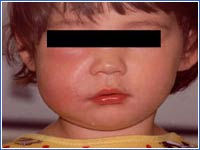Reducing the Risk
Dental caries is the most common chronic disease of childhood. Untreated caries can lead to local and systemic complications, such as:
- Infections (Dental abscess, facial cellulitis, brain abscess)
- Pain
- Nutrition and growth changes
- Sleep dysfunction
- Poor self-esteem
Caregivers can decrease their own caries levels by:
- Receiving regular comprehensive dental care, including during pregnancy
- Limiting the amount of sugar and simple carbohydrates in the diet and snacks
- Maintaining excellent oral hygiene by brushing twice daily with a fluoridated toothpaste and cleaning between the teeth daily
- Using preventive agents, such as prescribed mouth rinses, toothpastes, and Xylitol-containing products (gums, lozenges)
Facial Cellulitis

References
US Department of Health and Human Services. Oral health in America. A Report of the Surgeon General. Rockville, MD: US Department of Health and Human Services, National Institute of Dental and Craniofacial Research, National Institutes of Health; 2000.
Douglass JM, LI Y, Tinanoff N. Systematic review of the association between mutans streptococci in primary caregivers and mutans streptococci and dental caries in their children. Pediatric Dentistry 2008, 30(5):375-387.
American Academy of Pediatric Dentistry. Guideline on Perinatal Oral Health Care. Revised 2011. 33(6): 118-123.
Caries Risk Assessment and Management. July18, 2023. https://www.ada.org/resources/ada-library/oral-health-topics/caries-risk-assessment-and-management.